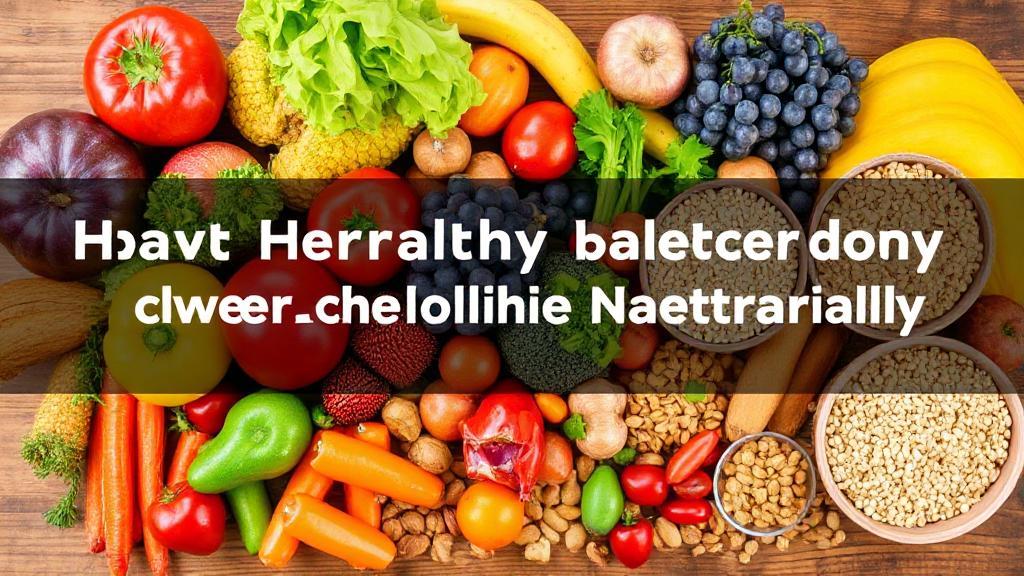Understanding Cholesterol and Its Impact on Health
Cholesterol is a waxy, fat-like substance found in every cell of your body. While it is essential for hormone production, vitamin D synthesis, and cell membrane integrity, high levels of low-density lipoprotein (LDL) cholesterol—often called "bad" cholesterol—can increase your risk of heart disease and stroke. In contrast, high-density lipoprotein (HDL) cholesterol is considered "good" because it helps remove excess cholesterol from your bloodstream.
According to the American Heart Association, nearly 94 million U.S. adults age 20 or older have total cholesterol levels higher than 200 mg/dL. Managing cholesterol naturally is not only possible but can be highly effective when approached with consistent lifestyle and dietary changes.
Dietary Strategies to Lower Cholesterol
Increase Soluble Fiber Intake
Soluble fiber binds cholesterol in your digestive system and helps remove it from your body. Aim for at least 5–10 grams per day. Top sources include:
- Oats and oat bran
- Barley
- Beans and lentils
- Apples, pears, and citrus fruits
- Psyllium husk
For more on fiber’s role in cholesterol management, see the Mayo Clinic’s guide to dietary fiber.
Choose Healthy Fats
Not all fats are created equal. Replace saturated fats (found in red meat and full-fat dairy) with healthier unsaturated fats:
- Monounsaturated fats: Olive oil, avocados, almonds, cashews, peanuts
- Polyunsaturated fats (including omega-3s): Fatty fish (salmon, mackerel, sardines), walnuts, flaxseeds, chia seeds
Learn more about the health benefits of omega-3 fatty acids.
Limit Saturated and Trans Fats
- Saturated fats: Red meat, butter, cheese, full-fat dairy, coconut oil, palm oil
- Trans fats: Some margarines, processed foods, baked goods (look for "partially hydrogenated oils" on labels)
For more on reducing daily sugar and unhealthy fat intake, see effective strategies to reduce your daily sugar intake.
Incorporate Plant Sterols and Stanols
Plant sterols and stanols, found in fortified foods (like some margarines, orange juice, and yogurt drinks) and supplements, help block cholesterol absorption in the gut. Consuming 2 grams per day can lower LDL cholesterol by about 5–15%. Learn more about plant sterols and stanols.
Embrace Cholesterol-Lowering Foods
- Nuts: Almonds, walnuts, pistachios (rich in healthy fats and fiber)
- Avocados: High in monounsaturated fats and fiber
- Soy: Soybeans, tofu, and soy milk can help lower LDL
- Garlic and green tea: May have modest cholesterol-lowering effects
For more on anti-inflammatory foods, see top anti-inflammatory foods to include in your diet.
Lifestyle Changes for Cholesterol Management
Get Active
Regular physical activity can help raise HDL and lower LDL cholesterol. The CDC recommends at least 150 minutes of moderate-intensity aerobic exercise (like brisk walking, cycling, or swimming) or 75 minutes of vigorous-intensity exercise per week. Even short bouts of activity throughout the day can add up.
For more, see effective strategies to improve your cardiovascular health.
Maintain a Healthy Weight
Carrying extra weight—especially around your midsection—can contribute to high cholesterol. Losing as little as 5–10% of your body weight can significantly improve cholesterol levels. Combine dietary changes with regular exercise for sustainable weight management.
Quit Smoking
Smoking damages blood vessels, lowers HDL cholesterol, and increases your risk of heart disease. Quitting can improve your cholesterol profile and benefit your heart health almost immediately. For support, visit Smokefree.gov.
Limit Alcohol Intake
Excessive alcohol can raise cholesterol and triglyceride levels. If you drink, do so in moderation: up to one drink per day for women and up to two for men.
Manage Stress
Chronic stress may indirectly affect cholesterol by influencing your eating habits and activity levels. Try stress-reducing techniques such as meditation, yoga, deep breathing, and spending time in nature. Learn more about the benefits of living a stress-free lifestyle.
Natural Supplements: Proceed with Caution
While diet and lifestyle are paramount, some supplements may help lower cholesterol. Always consult your healthcare provider before starting any new supplement, as some may interact with medications or have side effects.
- Psyllium husk: A soluble fiber supplement
- Plant sterols and stanols: Available in fortified foods and supplements
- Red yeast rice: Contains compounds similar to prescription statins (use only under medical supervision)
- Omega-3 fatty acids: Found in fish oil or algal oil supplements (best for lowering triglycerides)
For more, see the health benefits of omega-3 fatty acids.
Sample Daily Meal Plan for Lowering Cholesterol
When to See a Doctor
While natural approaches can be highly effective, they may not be sufficient for everyone. Seek medical evaluation if:
- Your cholesterol remains high despite lifestyle changes
- You have a family history of heart disease
- You have other risk factors like diabetes or high blood pressure
Regular check-ups and blood tests are important to monitor your progress. For more, see natural ways to lower blood pressure without medication.
A Holistic Approach for Long-Term Success
Managing cholesterol naturally is about adopting a comprehensive and sustainable approach. It’s not about quick fixes but making lasting changes to your diet, activity, and daily habits. For additional support, consider:
- Effective strategies to reduce inflammation naturally
- Effective ways to improve digestion naturally
- Top benefits of adopting a plant-based diet
- Effective strategies to improve your sleep quality
Remember: Always consult your healthcare provider before making significant changes to your diet, exercise, or supplement routine.
By focusing on a heart-healthy diet, regular exercise, weight management, and other positive habits, you can take control of your cholesterol and support your overall well-being for years to come.
